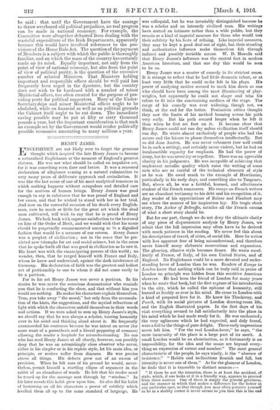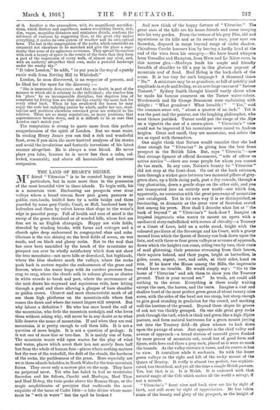HENRY JAMES.
ENCLISIDIEN are not likely ever to forget the generous thought which inspired tho late Henry James to become a naturalized Englishman at-the moment of England's greatest distress. His was not what should be called an impulsive act, for it was something even finer and better. It was a reasoned declaration of allegiance coming as a natural culmination to very many years of deliberate approach and assimilation. It was like the last scene of one of his most analytical romances in which nothing happens without scrupulous and detailed care for the motives of human beings. Henry James was good enough to say in substance that he was proud of England and her cause, and that ho wished to stand with her in her trial. And now on the sorrowful occasion of his death every English. man, care he much or little for the great art which the dead man cultivated, will wish to say that he is proud of Henry James. We look back with supreme satisfaction to the bestowal on him of the Order of Merit, and we would wish that his name should be perpetually commemorated among us in a dignified fashion that would be a measure of our esteem. Henry James was a prophet cf civilization ; not in the sense that ho pre- dicted new triumphs for art and social science, but in the sense that he spoke forth all that was good in civilization as he saw it. His heart was with the emancipating powers of this world ; no wonder, then, that he ranged himself with Franco and Italy, whom he knew and understood, against the dark intolerance of Germany. His declaration of faith was the greatest and holiest act of partisanship to one to whom it did not come easily to be a partisan.
For in his art Henry James was never a partisan. In his stories he was never tho conscious demonstrator who reminds you that he is conducting the show, and that without him you would see nothing. He makes his characters explain themselves. True, you take away " the moral," but only from the accumula- tion of the hints, the suggestions, and the myriad refractions of light with which the characters unfold themselves in their words and actions. If we wore asked to sum up Henry James's style, we should say that he was always a scholar, turning humanity over in his mind and thinking aloud about it. He frequently overcrowded his sentences because he was intent on never (for mere want of a parenthesis and a liberal peppering of commas) allowing tho reader a loophole for misunderstanding. No one who has read Henry James at all closely, however, can possibly deny that he was an astonishingly close observer who never, either in his simpler or in his replete stylealot his main idea, or principle, or motive suffer from dimness. He was precise above all things. His defects grow out of an excess of precision. When he felt sure of his ground he would, never- theless, permit himself a startling ellipse of argument in the midst of an abundance of words. He felt that his reader must be tuned up for the message sent through by "wireless." In his later novels this habit grew upon him. So also did his habit of bestowing on all his characters a power of subtlety which levelled them all up to the same standard of language. He was colloquial, but he was invariably distinguished because he was a scholar and an intensely civilized man. Hia writings have earned an intimate rather than a wide public, but they
remain as a kind of imperial measure for those who would test their subtlety by his feats of refining. Like imperial measures, they may be kept a good deal out of sight, but their standing and authoritative influence make themselves felt through indirect and possibly invisible moans. W. D. Howells said that Henry James's influence was tho central fact in modern American literature, and that one day this would be seen to be so.
Henry James was a master of comedy in its strictest sense. It is strange to reflect that he had little dramatic talent, or at least very little that he could make felt in his plays. His power of analysing motive seemed to mark him down as one who should have been among the meat illuminating of play- wrights, but apparently he could not shape and trim his talent to fit into the constraining medium of the stage. The range of his comedy was ever widening, though not, we think, at the end for the better. Pessimistic critics thought they saw the limits of his method looming across his path very early. But his path seemed longer when ho left it than when he first set foot on it. It became clear that Henry James could not run dry unless civilization itself should run dry. He wrote almost exclusively of people who had the means and the leisure to please themselves intellectual' y. But
so did Jane Austen. He was never vehement (nor well could be in such a setting), and certainly never violent, but he had an
inexhaustible capacity for emphasis. Ho had the power of irony, but he was never icy or repellent. There was an agreeable charity in his judgments. Ho was incapable of achieving that unpleasant metallic quality which ruins the writing of some men who are as careful of the technical elements of style as he was. He owed much to the example of Hawthorne, particularly in his early days, and something also to Turgenev. But, above all, he was a faithful, learned, and affectionate student of the French romancers. His essays on French writers are an abundant testimony to his debt and his recognition of it.
Any reader of his appreciations of Balzae and Flaubert may see where the sources of his inspiration lay. His tragic short story, The Author of Beltrafflo, satisfies all the French canons of what a short story should be.
But for our part, though we do not deny the ultimate clarity of any piece of dispassionate analysis by Henry James, we admit that the full impression may often have to be derived with much patience in the reading. We never feel this about his descriptions of travel, of cities, of social life. Here he writes with less apparent fear of being misunderstood, and therefore saves himself many elaborate reservations and expansions.
Tho glancing, allusive style becomes firmer. He wrote excel- lently of France, of Italy, of his own United States, and of England. No Englishman could be a more devoted and under- standing lover of London than he was. Readers of Essays in London know that nothing which can be truly said in praise of London on principle was hidden from this sensitive American observer. He had been the friend of London for many years when he wrote that book, but the first rapture of his introduction to the city, which he called the epitome of humanity, still burned as freshly as over in his mind. Ho came to London with a kind of prepared love for it. He knew his Thackeray, and Punch, with its social pictures of London drawing-room life, and the English illustrated papers. In the first days of his
visit everything seemed to fall satisfactorily into the place in
his mind which he had made ready for it. Ho was enchanted ; the very uglinesses which he had expected, and duly found, wore a foil to the things of pure delight. These early impressions never loft him. " For the real London-lover," he says, " the mere immensity of the place is a large part of its merit. A small London would be an abomination, as it fortunately is an impossibility, for the idea and the name are beyond every- thing an expression of extent and number." The most general characteristic of the people, he says wisely, is the " absence of insistence." " Habits and inclinations flourish and fall, but intensity is never one of them." As for the glamour of London, he finds that it is traceable to distinct sources :-
" If there be not the intention, there is at least the accident. of style, which, if one looks at it in a friendly way, appears to proceed from three sources. One of these is simply the general greatness, and the manner in which that makes a difference for the better in any particular spot, so that though you may often perceive yourself to be in a shabby corner it never occurs to you that this is the end of it. Another is the atmosphere, with its magnificent mystifica- • tions, which flatters and superfuses, makes everything brown, rich, dim, vague, magnifies distances and minimises details, confirms the inference of vastness by suggesting that, as the great city makes everything, it makes its own system of weather and its own optical laws. The last is the congregation of the parks, which constitute an ornament not elsewhere to be matched and give the place a supe- riority that none of its uglinesses overcome. They spread themselves with such a luxury of space in the centre of the town that they form a part of the impression of every walk, of almost any view, and, with an audacity altogether their own, make a pastoral landscape under the smoky sky."
" It takes London," he adds, " to put you in the way of a purely rustic walk from Notting Hill to Whitehall."
London, he soon discovered, is no respecter of persons, and he liked her the more for the discovery :-
" She is immensely democratic, and that, no doubt, is part of the manner in which she is salutary to the individual ; she teaches him his place' by an incomparable discipline, but deprives him of complaint by letting him see that she-has exactly the same lash for every other back. When he has swallowed the lesson he may enjoy the rude but unfailing justice by which, under her eye, repu- tations and positions elsewhere esteemed great are reduced to the relative. There are so many reputations, so many positions, that supereminence breaks down, and it is difficult to be so rare that London can't match you."
The temptation is strong to quote more from this perfect comprehension of the spirit of London. But wo must resist. In reading Henry James you can find a rich and wonderful feast, even if you skim the more knotted analyses of his stories and avoid the involutions and fantastic inventions of his latest manner altogether. He is always a wise friend. He never plays you false, because he is never less than a calm, col- lected, reasonable, and above all honourable and courteous companion.



































 Previous page
Previous page